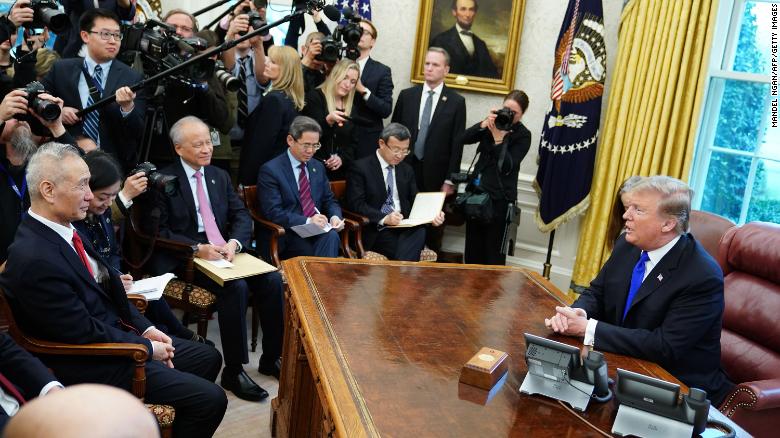Trump predicts 'very good chance' of China trade deal
President Donald Trump expressed optimism on a trade deal with China, after meeting with Chinese Vice Premier Liu He in the Oval Office on Friday afternoon.
"I think we both feel there's a very good chance the deal will happen," Trump said, adding that the group of negotiators has "been making a lot of progress."
Trump said he plans to meet with President Xi Jinping to work out the final details of a deal "fairly soon," and those conversations are likely to take place at Mar-a-Lago next month.
Treasury Secretary Steven Mnuchin noted that Liu He and his team had agreed to extend their trip for an additional two days as negotiations continue ahead of the March 1 deadline.
The vice premier expressed similar optimism, saying through a translator, "We believe that it is very likely that it will happen and we hope that ... we'll have a deal. ... The Chinese side is ready to make our ultimate effort."
It is still not entirely clear if the two sides will officially signal they plan to extend the deadline.
"If I see progress being made, substantial progress being made, it would not be inappropriate to extend that deadline," Trump said, suggesting that he "would be inclined" to allow up to a month longer for negotiations.
One sign of progress for the administration: a commitment from the Chinese to purchase an additional 10 million metric tons of American soybeans.
"Strategy is working. Show of good faith by the Chinese. Also indications of more good news to come," Agriculture Secretary Sonny Perdue said in a tweet Friday.
At this point the two sides have been making progress nailing down text in memorandums of understanding in six areas: nontariff barriers, forced technology transfers, intellectual property, cybertheft, agriculture and currency. But there are still gaps on certain issues.
Trump's top trade negotiator US Trade Representative Robert Lighthizer, acknowledged forced technology transfers was one area of contention still being worked out, noting the group had "made a lot of progress" in its negotiations, but it "has to be done properly."
The lifting of tariffs between the two sides will be largely based upon what kind of deal is brokered and what kinds of enforcement and verification mechanisms will be in place. On stickier areas tied to structural issues, it appears that the two sides have differing views on what they are seeking to accomplish.
The business community cares less about the March 1 deadline and more that the deal is comprehensive and sustainable.
"A short fix will lead us back to negotiating these issues in a short period of time," said Myron Brilliant, executive vice president and head of international affairs at the US Chamber of Commerce.
"This opportunity comes with costs if not realized," said Brilliant. "The cost to ... China and the United States -- but more broadly our view is the stakes are too high and everyone is watching what happens between the United States and China."
News Courtesy: www.cnn.com











